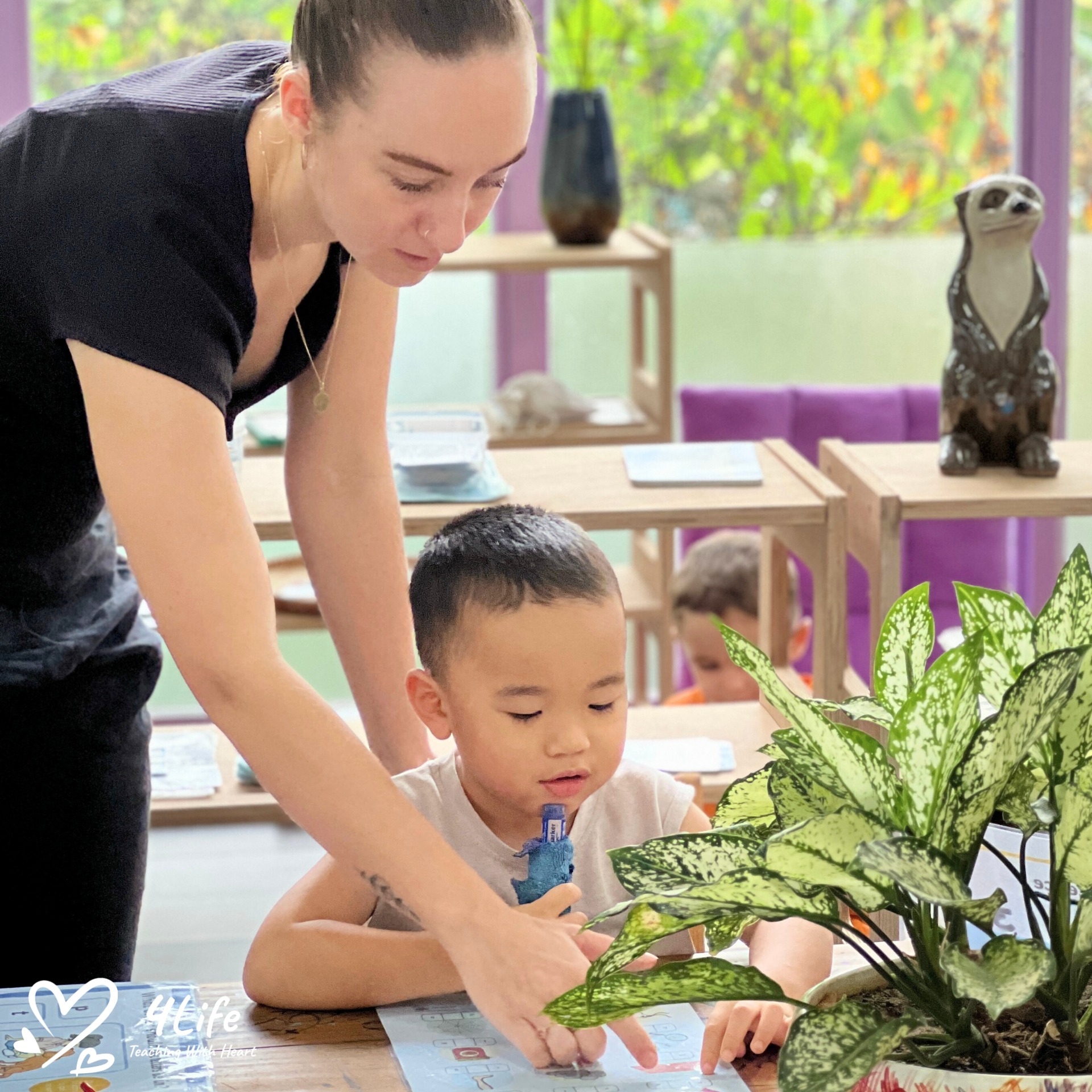Montessori teachers are not commanders but gentle guides who inspire children to learn with curiosity and joy. They lead by example, not by instruction, creating an environment where children grow through exploration and independence. Let’s find out with 4Life Education how Montessori teachers guide learning while respecting each child’s individuality.
Understanding the Montessori teacher’s role
In the Montessori approach, the teacher’s role is far from traditional. Instead of standing in front of the class and directing every move, Montessori teachers carefully observe each child, understanding their interests, strengths, and areas for growth. Their main goal is not to control learning but to create an environment where it happens naturally.

Understanding the Montessori teacher’s role
This method values trust in the child’s inner drive to learn. Teachers serve as facilitators, providing tools, materials, and encouragement for children to explore at their own pace. In doing so, they foster independence and a love for learning that lasts a lifetime.
The shift from instructor to guide
A Montessori teacher steps back to let children take the lead. Rather than explaining every detail, they demonstrate how to use materials and then allow the child to explore independently. This shift transforms the classroom into a living, active space where discovery takes center stage.
When teachers adopt the role of guide, they empower children to think, make choices, and solve problems on their own. This autonomy strengthens self-confidence and critical thinking – essential skills for future success.
Building an environment that nurtures independence
Montessori classrooms are designed to promote freedom within limits. Every object, material, and activity has a purpose, helping children build skills through real experiences. Teachers take great care in preparing this environment, ensuring it is clean, orderly, and filled with opportunities to explore.
The teacher observes quietly, stepping in only when necessary. They guide children to make responsible choices, such as putting materials back in place or helping friends. This consistent approach builds discipline and self-control naturally, without the need for strict rules or commands.
Encouraging self-directed learning
Montessori teachers understand that real learning comes from doing. Children are encouraged to follow their interests — whether it’s counting beads, arranging shapes, or exploring nature. The teacher provides gentle support, ensuring that each child feels safe and confident to take the next step.

Encouraging self-directed learning
By guiding instead of commanding, Montessori teachers give children the power to own their learning journey. This sense of responsibility helps them become curious, motivated learners who enjoy challenges instead of fearing them.
The art of observation and understanding
Observation is one of the most important skills a Montessori teacher develops. Instead of constantly talking or correcting, teachers watch how children interact with materials, how they solve problems, and what captures their attention. Through this careful observation, teachers can identify when to offer help, when to step back, and when to introduce new challenges.
This process allows teachers to truly understand each child as an individual. Every child’s rhythm is respected — some learn quickly, others take time. What matters most is progress, not perfection. This patient and mindful guidance helps children feel valued and understood.
Responding with empathy and patience
Montessori teachers respond to challenges with calmness and empathy. When a child struggles or makes a mistake, the teacher sees it as part of the learning process, not a failure. Instead of punishment or scolding, they offer encouragement, helping the child reflect and try again.
This emotional support nurtures resilience and confidence. Over time, children learn to manage frustration, stay focused, and believe in their ability to improve. Such qualities are not just academic — they form the foundation for lifelong emotional strength.
Leading with respect and trust
Respect is at the heart of every Montessori classroom. Teachers treat children as capable individuals who deserve to be heard and understood. They model polite behavior, patience, and kindness, setting the tone for positive interactions among peers.

Leading with respect and trust
Trust also plays a key role. Montessori teachers trust that children want to learn, and this belief shapes how they teach. By trusting children’s abilities, teachers encourage self-reliance and responsibility. This deep mutual respect creates a warm and balanced learning environment.
Guiding collaboration and social growth
Beyond academic learning, Montessori teachers guide children in building social skills. Group activities, sharing materials, and helping one another are part of everyday life. Teachers demonstrate how to communicate gently, resolve conflicts peacefully, and respect others’ feelings.
These experiences prepare children for real-world relationships. They learn empathy, teamwork, and kindness – values that remain with them long after they leave the classroom.
The impact of Montessori teachers on lifelong learning
A Montessori teacher’s influence extends far beyond the classroom. By teaching children how to think rather than what to think, they lay the foundation for lifelong curiosity and self-motivation. Children who experience this approach often become independent thinkers who seek understanding, not just answers.
Their confidence in making decisions and solving problems grows naturally through consistent guidance. This approach shapes not only strong students but also compassionate, thoughtful individuals who value learning as a joyful part of life.

The impact of Montessori teachers on lifelong learning
Inspiring a love for discovery
When teachers lead with guidance instead of authority, they awaken a love for discovery in every child. Lessons become moments of wonder, mistakes become opportunities, and challenges turn into stepping stones. The Montessori teacher’s greatest reward is seeing the spark of curiosity grow stronger day by day.
Montessori teachers – guides who lead, not command – are the heart of a child’s journey toward independence and growth. Their quiet presence, thoughtful observation, and deep respect for each child’s pace make learning joyful and meaningful. By guiding rather than directing, they empower children to explore, create, and develop confidence that lasts a lifetime. Montessori teachers truly embody the spirit of leading with love, patience, and understanding — a model that continues to inspire both educators and families worldwide.








0 Comments